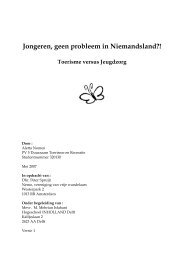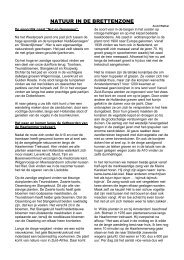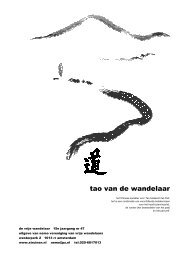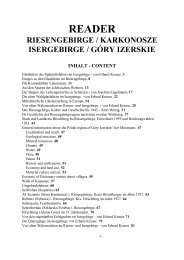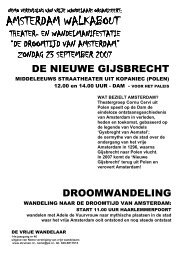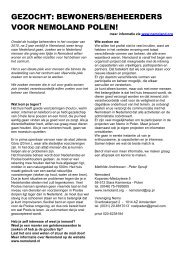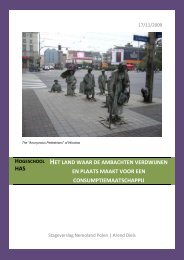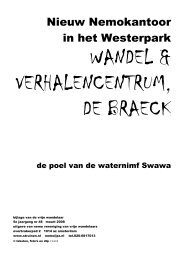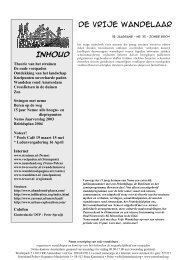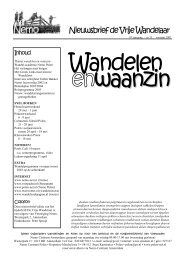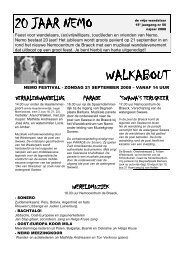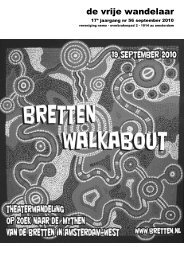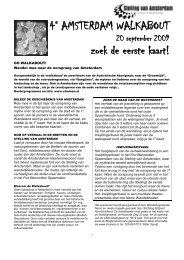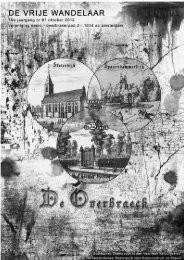Stara Kamienica - Nemo
Stara Kamienica - Nemo
Stara Kamienica - Nemo
You also want an ePaper? Increase the reach of your titles
YUMPU automatically turns print PDFs into web optimized ePapers that Google loves.
At this moment Josef Zaprucki owns 50 ha, of which 20 ha is rented from <strong>Nemo</strong>land. 1 ha<br />
oats, 0,5 ha wheat, 0,5 ha buckwheat, the other area grassland divided over class 4<br />
(‘podzolgronden met lage waterstand hogere zuurtegraad’), class 5 (‘droogtegevoelige<br />
zandgrond en ongunstige ligging’) and class 6 (‘slechte grond, verzuurd en droogte<br />
gevoelig’). This means that the soil in his area is very hard to use for growing crops, but Jozef<br />
experiments with grapes for the production of wine. Part of these products and the grass can<br />
be used for feeding the sheep. But other feed should be bought to complete the diet.<br />
To get the certificate ‘ecological’ for the feed, it needs to be officially ecological produced,<br />
which means no artificial fertilizer and no pesticides applied to the crops. Feed additives<br />
should be allowed by the ecological regulations of the country and even the EU if sheep are<br />
sold as ‘ecological’. So farmers should be very careful with putting the label ‘ecological’ on<br />
their product.<br />
5.4 Health Care of animals<br />
Because of strict regulations for ecological farmers on the aspect of health care for their<br />
animals, they have to take preventive measures rather than give them medicines afterwards.<br />
Some recommendations to keep in mind so the farmer can use as little medicine as possible<br />
are:<br />
(1) The selection of appropriate breeds and types;<br />
(2) Proper balanced nutrition;<br />
(3) Appropriate housing, access to the outdoors, and sanitation;<br />
(4) Stress reduction by the allowance of natural behaviour and exercise; and<br />
(5) Preventive measures such as vaccines and other inoculants.<br />
Prophylactic treatments, hormones, and antibiotics are categorically incompatible with<br />
organic practices. Animals are treated with medications only when they are sick—indeed the<br />
standards make it illegal to withhold treatment from an ill animal. However, animals treated<br />
with a prohibited substance cannot have their products sold as organic. The animal must be<br />
diverted from organic production and the products must be sold through conventional<br />
channels.<br />
Holistic veterinarians specialize in alternatives that do not rely on synthetic chemicals for<br />
treatment of animal illnesses. Traditional herbal medicine, homeopathy, acupuncture,<br />
chiropractic, and probiotics all offer alternative modes to veterinary treatments administered<br />
in conventional livestock production to counter the effects of illness, also referred to as<br />
allopathic medicine.<br />
These modes of animal health care need not be mutually exclusive. Each deserves<br />
consideration, criticism, and further exploration. However, organic animal husbandry has far<br />
more questions than answers. Organic standards go beyond food safety concerns. They also<br />
include issues of consumer acceptance, animal welfare, and resource management. In general,<br />
organic consumers expect organic animals to be both treated humanely and not treated with<br />
drugs. Organic producers may need to resort to allopathic methods in order to save the life of<br />
an animal. However, an animal treated with a prohibited substance loses its organic status.<br />
Again, ‘ecological’ conditions of rearing animals are very strict and therefore the name<br />
‘ecological’ should be used carefully. For real ecological products, the animals used for



